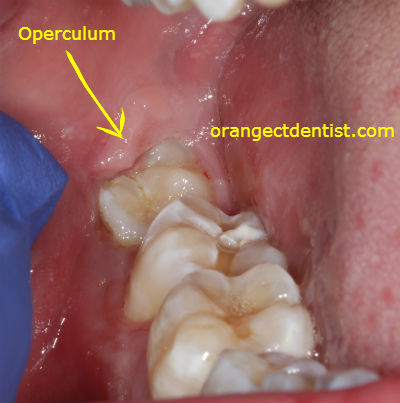
Operculum overling a wisdom tooth on a patient from West Haven, CT. Photo by Dr. Nicholas Calcaterra.
An operculum is a fairly common dental finding in the teenage and young adult population. As you can see on the photo to the right, an operculum is a flap of gum tissue that covers some of the chewing surface of a tooth.
An operculum is most commonly observed with lower wisdom teeth. But operculua (plural of operculum) can also be seen with permanent first and second molars as well as some deciduous teeth.
An operculum is observed when a tooth is erupting and is beginning to “peek through” the overlying gum tissue. In nearly all cases, the tooth continues to move into the mouth and the gum tissue recedes. Ultimately, the tooth moves into normal positions, and there is no gum tissue covering the chewing surface.
In the case of lower third molars (wisdom teeth), there is often insufficient space for the tooth to erupt into the mouth. As a result, the tooth remains partially submerged underneath the gum tissue. This leads to an operculum being present permanently (unless treatment is rendered).
Dental problems that an operculum can cause
As you can imagine, an operculum present for longer periods of time can lead to numerous issues. These include:
- Cheek or Gum Biting – because there is soft tissue overying the tooth, you can often bite down on the operculum or the closely attached cheek tissue. This can be very painful. See our cheek biting page.
- Acute Pericoronitis – food and bacteria can often get stuck underneath the operculum. When this happens, it can lead to a painful and dangerous infection called pericoronitis. The symptoms can include redness, pain, and inflammation of the area. Immediate treatment is always indicated.
- Dental Decay – since it is very difficult to clean under the gum tissue, cavities can often develop, even if you have excellent oral hygiene and brush regularly.
For the above reasons, we will often recommend extraction of wisdom teeth with or without IV sedation when an operculum is present.
